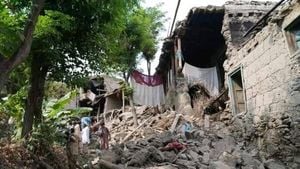The U.S. State Department recently issued its highest-level security alert for several cities in Mexico just across the Texas border, signaling growing concerns over violent crime, kidnappings, and the presence of improvised explosive devices (IEDs) threatening travelers and residents alike. This alarming advisory primarily targets cities across the Mexican state of Tamaulipas, where the situation has escalated dramatically.
Reports indicate a marked rise in shootouts occurring during overnight hours, particularly around the city of Reynosa, which has become a flashpoint for violent confrontations between rival criminal organizations. The danger, as highlighted by U.S. officials, is not limited to armed conflicts; the state also warns of IED threats along dirt roads connecting various towns, including Rio Bravo, Valle Hermosa, and San Fernando.
According to the Houston Chronicle, the State Department's alert emphasizes the significant risk posed by these criminal groups, which have increasingly resorted to the manufacture and use of IEDs as part of their operations. The proximity of these threats to the Texas border raises serious concerns about the safety of U.S. citizens, especially those planning to cross over for business or leisure.
Notably, the advisory stipulates stringent travel restrictions for U.S. government employees, who are expressly prohibited from being present in Reynosa and Rio Bravo outside of daylight hours. There’s also advice for travelers urging them to avoid dirt roads altogether, as these areas may be compromised with IEDs, endangering anyone who unwittingly ventures off the paved routes.
The State Department recommends maintaining situational awareness; travelers are advised to stay informed by monitoring local media and to adhere strictly to all safety guidelines when traversing these high-risk areas. It is insisted they keep to paved roads, avoid touching any unfamiliar objects, and remain vigilant about their surroundings.
This call for caution is underscored by the increasing trend of violence and use of explosive devices along the border, illustrating the urgent need for travelers to assess the risks associated with border crossings as tensions continue to rise within Tamaulipas. The dangerous environment in Reynosa and its surrounding areas not only threatens those who live there but poses potential risks for cross-border travelers.
The situation emphasizes the complicated dynamics within regions severely impacted by organized crime, drawing attention to how local populations are affected and the international ramifications as neighboring U.S. states grapple with these threats. While authorities strive to curb such violence, the increasing prevalence of IEDs marks a dangerous evolution of criminal tactics.
The Mexican government faces the dual challenge of managing law enforcement responses to violent crime and providing adequate support for communities affected by these threats. Increased violence often leads to mass displacement and creates uncertainty for families who rely on cross-border endeavors for their livelihoods.
Although travel to these regions may be necessary for some, the heightened risks challenge the notion of safe and secure passage. With the State Department's advisory remaining prominent, individuals are left weighing the need against potential dangers present just across the U.S. border.
U.S. officials have highlighted the alarmingly growing reliance on IEDs among criminal organizations, which poses significant security challenges and calls for coordinated efforts from local, state, and federal entities on both sides of the border to mitigate these threats and protect public safety.
To conclude, the recent escalations in violence and the threat from IEDs serve as grim reminders of the precarious situation at the U.S.-Mexico border. Travelers are strongly urged to heed official advisories, ensuring their safety by adopting cautious and informed travel practices as they navigate these increasingly perilous environments.



